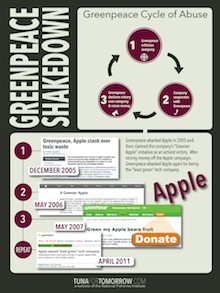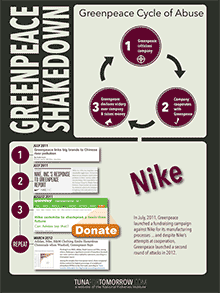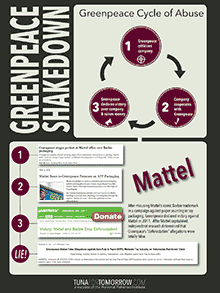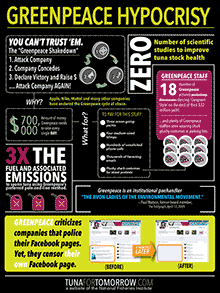Today we give a well-deserved tip of the cap to the National PostŌĆÖs Rex Murphy.
In a recent column thatŌĆÖs well worth the read, Murphy surveyed the spectacle that Greenpeace has become, charting how the organization has evolved from a scrappy, ideological underdog to what Murphy terms a ŌĆ£corporate [fundraising] brandŌĆØ unto itself.
While Greenpeace used to be known for taking bold moves such as staging sit-ins at nuclear weapons testing grounds, Murphy writes, they now resort to protests directed at ŌĆ£gentle-minded, humane, risk-averse Western targetsŌĆØ in what amounts to ŌĆ£pure kabuki, [a] show without consequence.ŌĆØ Their goal: fundraising in an effort to replenish GreenpeaceŌĆÖs corporate coffers.
But while itŌĆÖs encouraging to see Murphy call out Greenpeace after decades of childish antics, his voice remains a lonely one in the broader media.
The environmental press, in particular, canŌĆÖt or wonŌĆÖt see what Murphy does, and indeed go out of their way to praise the accomplishments of Greenpeace, despite any evidence that their juvenile actions are having a positive impact on global sustainability efforts. In the world of canned tuna, for instance, the Greenpeace playbook is to make false claims about how tuna is sourced while refusing to join the global tuna industry in real sustainability dialogue.┬Ā And where are the journalists asking Greenpeace to do an economic impact study for the highly inefficient, ŌĆ£throwbackŌĆØ pole and line methods they recommend for tuna fishing? How much more would a can of tuna cost for the families Greenpeace claims to be helping if tuna companies rolled back decades of technological progress?
And who in the press is asking how many more fishing boats, spending how many more man hours and burning how much more fuel, would be required to meet global seafood demand under GreenpeaceŌĆÖs preferred fishing policies? Has any reporter demanded that their patron saints of environmentalism do an environmental impact study of their own preferred policies?
When Greenpeace advocates for pole and line caught canned tuna, theyŌĆÖre also advocating for dramatically increasing the priceŌĆöand carbon footprintŌĆöof one of the most nutritious and affordable foods available to Americans, plain and simple. And in a country that eats far less than half of the recommended amount of seafood suggested per week, giving in to GreenpeaceŌĆÖs policy prescription of catching fish one at a would be disastrous.
Rex Murphy deserves a round of applause for seeing through the rhetoric and theater of GreenpeaceŌĆÖs demands and for recognizing that the organization is nothing more than an elaborate fundraising scheme ┬ĀWe hope the rest of the media follows his lead and starts to ask Greenpeace the tough questions about their prescriptions for tuna sustainability.








